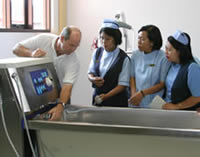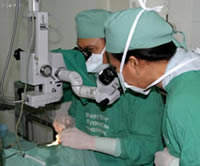2 July 2004
The 12 October Australia Memorial Centre at Sanglah Hospital is a gift from
the people of Australia to the people of Indonesia.
The centre, funded by the Australian Government as a memorial to the 202
people who died in the Bali bombing in October 2002, was handed over in a
ceremony on Friday 2 July 2004.
The new centre houses a 14-bed post-operative intensive care unit, a six-bed
intensive coronary care unit, a 15-bed burns unit and a dedicated operating
theatre.
Other facilities at Sanglah Hospital are also being upgraded as part of
Australia's $10.5 million Bali Memorial assistance package.
The upgrades include refurbishment of the hospital's morgue, an improved
water supply system, a new hospital incinerator and training for hospital staff
in the use of specialized equipment.
Australia is also assisting about 50,000
people in Bali affected by blindness by contributing more than $3.3 million for
the construction of the Australia-Bali Memorial Eye Centre and for two mobile
outreach eye clinics.
This project will continue the work of the John Fawcett Foundation,
including provided eye care services for the poor.
Construction is expected to begin early next year and when completed will
provide facilities for eye examinations, eye treatment, two operating theatres,
a seven-bed inpatient ward and training and administration blocks.
The mobile clinics will provide a range of services including diagnostic
examination and treatment, surgery and will offer patients free glasses.
As well as providing health and medical related assistance, Australia
provides seed funds and technical advice to selected small and medium sized
businesses to enable them to set up new enterprises and recover financially
from the downturn in tourism brought about by the bombing.
The Bali Rehabilitation Fund (BRF)
The Bali Rehabilitation Fund (BRF) was established by the Australian Government, through its international aid agency, AusAID, to respond to emerging socio-economic pressures on the Balinese community resulting from the downturn in tourism following the bombings on 12 October 2002.
Balinese communities were deeply affected by the economic downturn resulting from the Bali bombing and exacerbated by SARS.
Australia has provided $A1.5 million to the BRF to maintain a range of activities to promote alternative income sources for affected communities.
BRF is filling an important niche by providing targeted support to small businesses, households and individuals.
Australia is helping Balinese communities to diversify and strengthen enterprises that can thrive even when the tourism sector is less buoyant.
Activities begun under the Fund include a pig-raising cooperative for ex-tourism workers, an eco-tourism project, capacity building for a handicrafts cooperative and support for a women's micro-credit scheme.
An appraisal panel approves activities and priority is given to projects that support economic initiatives that specifically benefit women or other vulnerable target groups.
Since its inception in March 2004, the BRF has funded 25 individual projects.
Australian Assistance to Sanglah Hospital
Of the $10.5 million Australian Government package of assistance to the Bali health system, $4.5 million was used to the upgrade of facilities at Sanglah Hospital.
Sanglah Hospital, the largest of the 33 hospitals on Bali, is a 738-bed government-owned enterprise that serves as a referral hospital for the provinces of Bali, Nusa Tenggara Timur (NTT) and Nusa Tenggara Barat (NTB). The hospital offers an extensive range of specialist services, including cardiology, intensive care, burns and trauma, and a busy accident and emergency service, as well as more routine obstetrics and gynaecology, surgery, medicine, paediatrics and diagnostic services.
The Sanglah Hospital Assistance Package
New Intensive Care Centre: The 12 October Australia Memorial Centre is a new intensive care centre funded by the Australian Government, at a total cost of $3.6 million. It comprises a 14-bed post-operative Intensive Care Unit (ICU), a six bed Intensive Coronary Care Unit (ICCU), and a 15 bed Burns Unit and dedicated Operating Theatre.
The fully equipped two-storey centre has been built on the former site of the Burns Unit. Nusa Dua Rotary has also donated $115,000 of equipment to the Burns Unit Operating Theatre.
The 12 October Australia Memorial Centre at Sanglah Hospital in Bali was handed over on Friday 2 July to Indonesia's President, Megawati Sukarnoputri, by Australia's Parliamentary Secretary for Foreign Affairs, The Hon. Chris Gallus MP.
Refurbishment of the existing Morgue: Plans are now being finalised to upgrade the morgue at Sanglah Hospital. The upgrade will also include the purchase, installation and testing of specialised medical equipment for the morgue.
Other upgrades include: An improved water supply system, new hospital incinerator, and the provision of training to hospital staff for any specialised equipment procured and installed.
Emergency care program: Australia is also supporting the Government of Indonesia's new emergency care initiative, the Safe Community Program, which aims to improve pre-hospital services in cooperation with police and local government, especially the fire brigade. Short-term training will be delivered through the Indonesia-Australia Specialised Training Project (IASTP), part of Australia's aid program to Indonesia.
The Australia-Bali Memorial Eye Centre
The Australian Government's Bali Memorial package of assistance is also providing funding of $3.3 million for the construction of the Australia-Bali Memorial Eye Centre, and the provision of two mobile outreach eye clinics.
In Bali alone, operational blindness affects some 50,000 people.
The new eye centre, due to begin construction in early 2005, will allow the Bali Provincial Government, in cooperation with the John Fawcett Foundation, to expand sight restoration and blindness prevention programs for the benefit of the poor.
The Australia-Bali Memorial Eye Centre will be a stand-alone facility owned and managed by Denpasar's Indera Hospital. The Governor of Bali allocated No. 20, Jalan Melati, Denpasar as the site for the new eye centre.
The site is co-located with the Bali Provincial Health Department's main administration block. The project includes the construction of a new eye centre and the provision of two mobile outreach clinics.
The new centre will have provision for a diagnostic eye examination facility, eye treatment facility, two operating theatres and a seven-bed inpatient ward, as well as training and administration blocks.
Mobile Eye Clinics - Outreach Program
Through the outreach program, the following services will be provided to patients by the mobile eye clinics:
- Diagnostic examination and treatment - including refraction, treatment of infections, identification and treatment of eye diseases, measurement of intraocular pressure, blood and urine sugar levels, biometry, keratometry and A-scanning
- Surgical procedures - including removal of cataract and lens implant by extra capsular cataract extraction
- Optometry - issue of free spectacles
Program for Eastern Indonesia SME Assistance (PENSA)
PENSA is a private sector technical assistance facility that is supporting the growth of small and medium enterprises (SMEs) in eastern Indonesia.
It is managed by the International Finance Corporation, the private sector arm of the World Bank.
Australia's contribution to PENSA is $A4 million.
PENSA focuses on three broad areas:
- Improving access to capital - working with local financial institution to upgrade viable SME lending skills and products; assisting SMEs in improving their ability to present qualified lending proposals to banks.
- Improving business performance - working with SMEs, NGO partners, other service providers and large firms to improve the skills and knowledge base of entrepreneurs and managers; and to develop supply chain small firm linkage programs.
- Improving the business environment - working with local government, business association and other stakeholders to improve transparency and the regulatory framework.
PENSA's seaweed program
Seaweed is used as a vegetative gelatin and gumming agent in the processed food, pharmaceutical and cosmetic industries. Indonesia is the second largest producer of seaweed (after the Philippines) and has the potential to become the largest producer in the future due to its large seacoast resources. Seaweed farming provides an alternative livelihood to traditional coastal pursuits such as fishing.
PENSA's program in seaweed focuses on three components:
- Seaweed farmer group training - working with formal or informal seaweed farmers on improving their production and productivity through the introduction of new technology and training on 'best practice' for seaweed cultivation and post-harvest handling
- Assisting the development of small-scale mini-processing of seaweed close to the farm into a semi-product, semi-refined carrageenan (SRC). Adding further value as close to the farm as possible minimizes the per-unit transport costs that are significant in the remote areas of Eastern Indonesia
- Developing a web-based market information service called SEAplant.net that will enable farmer groups to link with end-users. SEAplant.net will also look to provide technical assistance and consulting services to all players within the seaweed value chain.
Bali Heritage Trust Ceremonial Coin Production
Pis bolong is a small circular coin with a square hole in the center, used commonly in Balinese Hindu religious ceremonies. The coins are used in sculptures and ceremonial hangings at shrines and temples as well as in daily offerings.
The Project
The Bali Heritage Trust (BHT) approached the Australian Government's Bali Rehabilitation Fund (BRF) to support it to further develop local pis bolong production.
The BRF is now supporting training for 10 young men who have lost their livelihoods following the Bali bombings in production techniques and to establish a co-operative from ongoing production and trade of the coins to the public market. The clients include travel agents and guides who have lost their jobs as well as craftsmen who have lost orders. It is expected that the production of these coins will provide them with a secure and stable livelihood as well as contribute to cultural heritage and the development of this new local industry.
BRF assistance takes the form of supply of basic tools required for the trainees to produce the coins, a one off supply of the metals required for the first batch of production and the costs of the training programme. Business management skills will also be provided at the later stages of the programme to encourage financial independence and security.
The project is being conducted in the Kamasan area of the Klungkung Regency. This is the main training centre, however once the participants have attained suitable production skills they will return to their own villages where they will produce coins and train and employ others as the demand for locally produced coins grows.
Project Partner
The Bali Heritage Trust is a local institution established initially with World Bank support to preserve Bali's local heritage and customs.


